TV Calibration gives you the most accurate picture quality from your display. R–G–B
When Busch Home Theater calibrates your display we not only give you an accurate image we show you how to properly view the new and old display formats SDR HDR and Dolby Vision
What is HDR? What is Filmmaker mode?
HDR stands for H-High, D-Dynamic, R-Range. HDR is intended to encompass the human visual system for brightness and color (DCI-P3). What most are not speaking about is APL (Average Picture Level) and the dynamic range of SDR vs HDR.
Film Maker More
Film maker mode will display Movies and Television shows as they were intended by the filmmaker. In the process of making a movie, there are an incredible amount decisions that make up the way a film will be presented to the viewer. Filmmaker mode will restore and preserve classic films as they were intended to be seen. Examples of what make up Film Maker Mode- motion processing, aspect ratio, frame rates, lighting and shadows details, color or black&white, the details that are unique for the given film.
FILMMAKER MODE APPLIES TO BOTH SDR & HDR CONTENT:
White Point: D65
IMAGE & DISPLAY PARAMETERS:
Maintain source content frame rate & aspect ratio
Motion interpolation: OFF
Overscan: Only if signaled with the image
Sharpening: OFF
TV Noise Reduction: OFF
Other image “enhancement” processing: OFF
Dolby Vision vs HDR and HLG
Dolby Vision is the best of the HDR formats. Dolby Vision is a closed loop system. Starting from the content creation and carrying that through to end user, maintaining the filmmaker’s intent. This is done by use of dynamic metadata and the certification of each individual display product.
Dolby Vision
ST-2084 (PQ) EOTF Base Content with Static Metadata Enhanced Content Layer with Dynamic Metadata Optionally Compatible with HDR10 Compatible with SDR TVs Optional for Ultra HD Blu-ray
HDR on the other hand, has several different versions and has no certification program for displays. This leaves the display manufacture with the task of deciphering the incoming signal using the static metadata that is embedded in the signal, to re-create the picture. This process assumes that the metadata is present and correct. This means that HDR is open to interpretation leaving an individualistic representation of what the picture should look like. To deal with this better several manufactures to their credit, have incorporated Dynamic Tone Mapping circuitry to help maintain the integrity of the signal.
HDR10
ST-2084 (PQ) EOTF Single Content Layer with Static Metadata Not Compatible with SDR TVs Mandated for Ultra HD Blu-ray Specified by the CTA for HDR compatible TVs
HLG Hybrid Log Gamma is a broadcast standard that was intended to be backward compatible with SDR displays created by the BBC and Japan’s NHK.
HLG
HLG – Hybrid Log Gamma EOTF with no Metadata Playback on HLG Compatible Sets Most Compatible with SDR TVsHDR10
SDR-HDR-Dolby Vision calibration information
TV Calibration is intended to preserve the content creation. Calibration is getting more complicated with the new formats of HDR and Dolby Vision now available in consumer televisions. The calibrator needs to understand how the SDR, HDR, Dolby Vision and Film maker mode formats work within the SMPTE BT.709, ST-2084 EOTF and PQ parameters. There is also new equipment needed to accomplish these tasks, along with the knowledge of some reference material to verify the results of the calibration at the different mastering levels.
Please see the Auto calibration results using Calman below.
XBR-77A9G SDR Pre and Post Calibration results
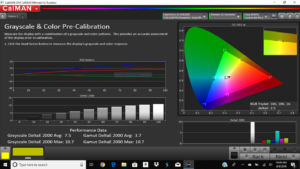
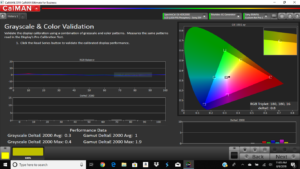
LG C9 65 inch Class 4K Smart OLED TV w/ AI ThinQ®
Images Showing OLED65C9PUA SDR Pre and Post Calibration results
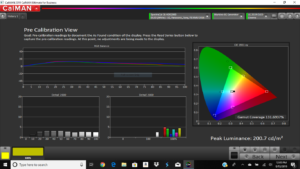
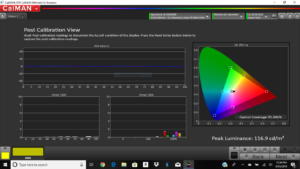
LG C9 65 inch Class 4K Smart OLED TV w/ AI ThinQ®
Images Showing OLED65C9PUA Dolby Vision Pre and Post Calibration results
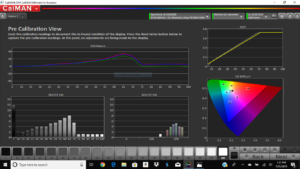
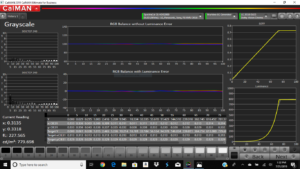
LG C8 65 inch Class 4K Smart OLED TV w/ AI ThinQ®
Images Showing OLED65C8PUA HDR Post Calibration results
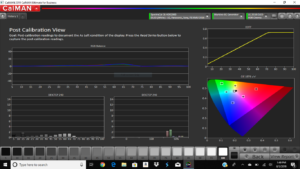
Links-More in depth info
Ultra HD Forum
Film Maker Mode
